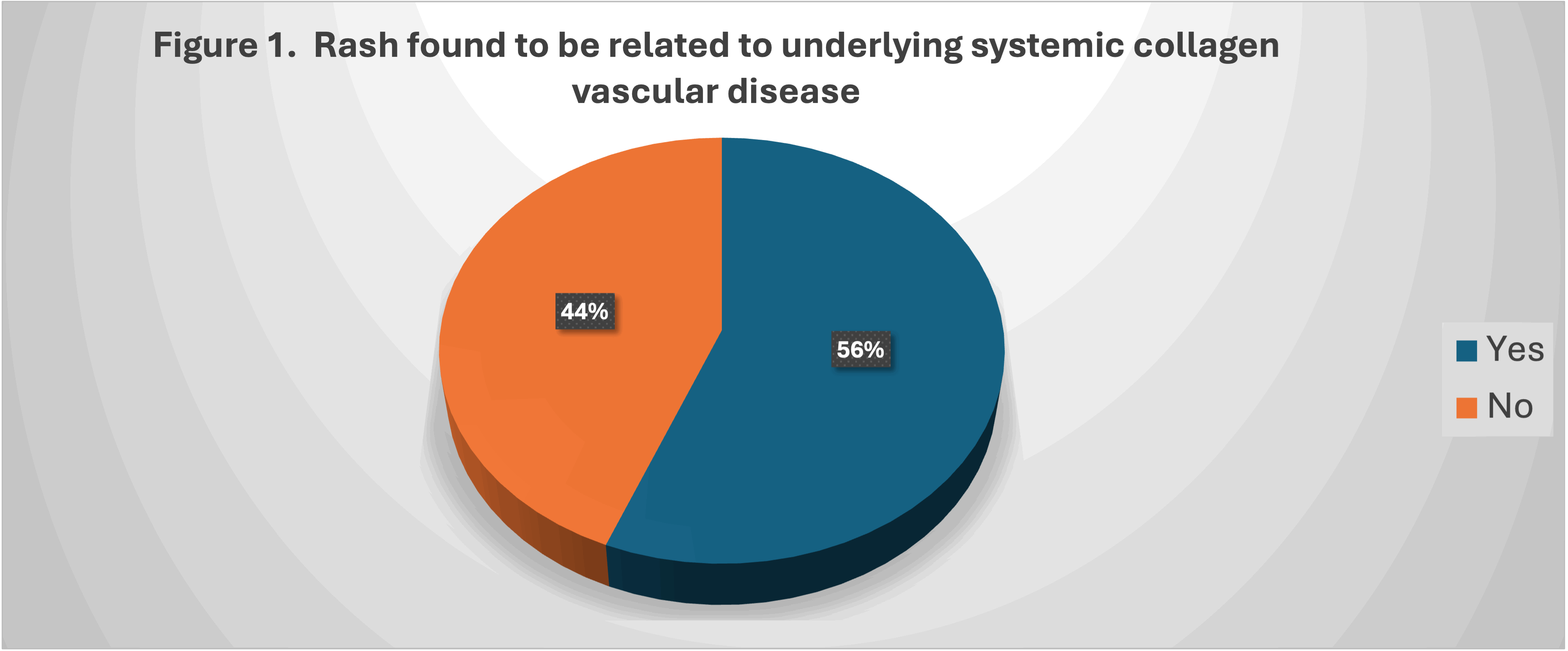Session Information
Date: Sunday, October 26, 2025
Title: (0210–0232) Measures & Measurement of Healthcare Quality Poster I
Session Type: Poster Session A
Session Time: 10:30AM-12:30PM
Background/Purpose: Collagen vascular diseases (CVD) often present with skin manifestations, but it is not always clear whether these changes are directly related to the underlying autoimmune condition. Therefore, a collaborative effort between rheumatologists and dermatologists is imperative to distinguish dermatoses related to systemic CVD versus dermatoses unrelated to systemic CVD. By promptly identifying systemic CVD with skin involvement, early changes in therapies can lead to better outcomes. The goals of this study were to 1) identify the percentage of dermatoses that were associated with systemic CVD, 2) identify and describe the frequency of immunosuppressive therapy modifications after patients’ first rheumatology-dermatology combined clinic (RDCC) visit.
Methods: All patients who were evaluated at the RDCC between February 2023 to February 2025 were included in this study. Patients were assessed simultaneously by one of two rheumatologists and one dermatologist. A retrospective study chart review was performed using the electronic medical records. Data collection included RDCC pre-clinic diagnosis and systemic CVD treatment, as well as post-clinic diagnosis and systemic CVD treatment. Secondary outcomes were autoimmune serologies, skin biopsy frequency, rates of clinical photography, and topical therapies. The data was analyzed using descriptive statistics. The IRB reviewed and approved the study (#2023-15460).
Results: A total of 98 patients were identified. Of these, 56% had dermatoses related to systemic CVD, while 44% had dermatoses unrelated to systemic CVD (Figure 1). At the end of the first RDCC visit, 43% of the patients had a change in immunosuppressive therapy, with the majority receiving an additional immunosuppressant or dose escalation of current therapy (Figure 2). Of the 62 patients with positive autoimmune serologies, the most common was antinuclear antibody (ANA), followed by anti-SSA antibody and anti-RNP antibody (Figure 3). Skin biopsies were performed in 22% of the cases, and clinical photography was recorded in 91% of the cases.
Conclusion: The RDCC was designed to streamline communications between rheumatologists and dermatologists, to improve diagnostic accuracy and timely management in patients with suspected systemic CVD with skin involvement. Based on our clinic experience, over half of the patients referred for dermatoses had underlying systemic CVD. This finding suggests there may be some diagnostic uncertainty when either field refers to the other and highlights the benefit of a combined clinic. The diagnostic uncertainty becomes more evident in patients with positive ANA or anti-SSA antibodies. Moreover, there was a change in immunosuppressive therapy in almost half of the patients after their initial RDCC visit, demonstrating the importance of timely management changes made possible through our RDCC.
 The post-clinic diagnoses include Systemic lupus erythematosus/ Cutaneous lupus erythematosus (25.6%), non-CVD (17.4%), Rheumatoid arthritis (10.2%), Scleroderma (10.2%), Psoriatic arthritis (9.18%), Dermatomyositis (8.2%), Undifferentiated connective tissue disease (6.1%), Sjogren’s syndrome (3.1%), Sarcoidosis (3.1%), Mixed connective tissue disease (2%), Erythema nodosum (1.0%), Panniculitis (1.0%), Morphea (1.0%), Raynaud’s (1.0%), Ankylosing spondylitis (1.0%).
The post-clinic diagnoses include Systemic lupus erythematosus/ Cutaneous lupus erythematosus (25.6%), non-CVD (17.4%), Rheumatoid arthritis (10.2%), Scleroderma (10.2%), Psoriatic arthritis (9.18%), Dermatomyositis (8.2%), Undifferentiated connective tissue disease (6.1%), Sjogren’s syndrome (3.1%), Sarcoidosis (3.1%), Mixed connective tissue disease (2%), Erythema nodosum (1.0%), Panniculitis (1.0%), Morphea (1.0%), Raynaud’s (1.0%), Ankylosing spondylitis (1.0%).
.gif) ANA: Anti-nuclear antibody, SSA: anti-SSA/Ro antibody, RNP: anti-RNP antibody, RF: Rheumatoid factor, Centromere: anti-centromere antibody, CCP: anti-cyclic citrullinated peptide, MDA5: anti-melanoma differentiation-associated protein 5, PR3: anti-proteinase 3 antibody, MPO: anti-myeloperoxidase antibody
ANA: Anti-nuclear antibody, SSA: anti-SSA/Ro antibody, RNP: anti-RNP antibody, RF: Rheumatoid factor, Centromere: anti-centromere antibody, CCP: anti-cyclic citrullinated peptide, MDA5: anti-melanoma differentiation-associated protein 5, PR3: anti-proteinase 3 antibody, MPO: anti-myeloperoxidase antibody
To cite this abstract in AMA style:
Peringeth G, Wu B, Wang S, McLellan B, Tagoe C, Lee J. Timely Dermatologic Diagnosis and Management Changes in Systemic Collagen Vascular Diseases: Experiences from the Rheumatology-Dermatology Combined Clinic [abstract]. Arthritis Rheumatol. 2025; 77 (suppl 9). https://acrabstracts.org/abstract/timely-dermatologic-diagnosis-and-management-changes-in-systemic-collagen-vascular-diseases-experiences-from-the-rheumatology-dermatology-combined-clinic/. Accessed .« Back to ACR Convergence 2025
ACR Meeting Abstracts - https://acrabstracts.org/abstract/timely-dermatologic-diagnosis-and-management-changes-in-systemic-collagen-vascular-diseases-experiences-from-the-rheumatology-dermatology-combined-clinic/

.gif)